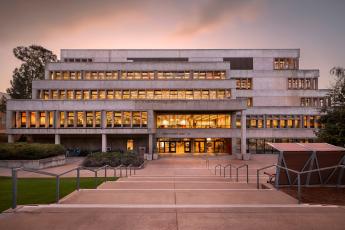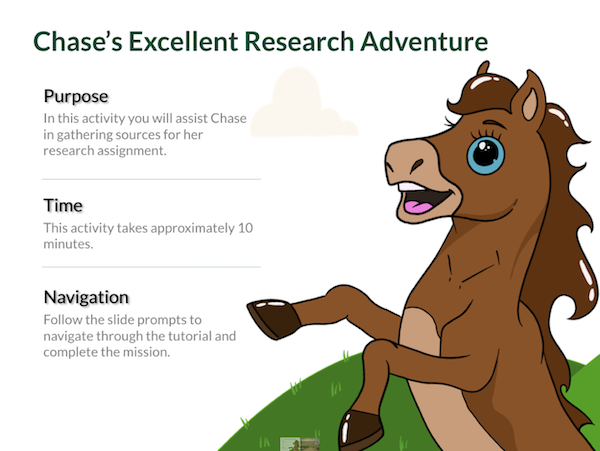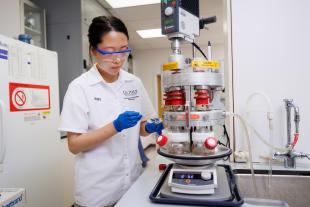'We’ve Made the Best Out of a Difficult Situation.' Kennedy Library's Virtual Programs Help Students Succeed

For many Cal Poly students, one of their first experiences in the Kennedy Library is attending a Foundational Experiences workshop through one of their courses during freshmen year. In these workshops, students are introduced to several library resources available for their research and other projects.
To support remote teaching and learning during the COVID-19 pandemic, the organizers of these Foundational Experiences workshops transitioned all of the content, including the Research, Introduction to Data Visualization, and Finding and Using Images, to virtual live, synchronous sessions that continue to champion Cal Poly’s Learn by Doing philosophy. Using Zoom meetings and leveraging features like polling, chat and breakout rooms, each workshop offers an engaging and collaborative experience to meet the needs of diverse learners.
“We wanted to create a live workshop experience for the students virtually as well as we could,” said Kaila Bussert, the library’s foundational experiences librarian. “It was especially important for us to provide meaningful interactions for the students and give them the opportunity to participate and work together.”

In the Research workshop, students learn how to strategically search Kennedy Library’s databases, ask questions and hone their research skills by completing in-class activities focusing on evaluating information for credibility. The Introduction to Data Visualization workshop shows students how to use data to support an argument, interpret data visualizations, and create effective data visualizations. Finally, in the Finding and Using Images workshop, students learn how to find the best images for their topics, analyze how an image achieves a specific purpose, and how to cite images properly.
“The students value the interactivity of these virtual workshops, especially activities such as quizzes and group discussions, and the opportunities to apply research strategies to their own topics and assignments,” said Mercedes Rutherford-Patten, library services specialist for reference and instruction. “Many students appreciated the opportunities to interact with librarians and peers through these activities and felt that their confidence in using library resources and services improved during the workshop.”
This workshop is co-facilitated by librarians, specialists and peer-instructors (the library’s research assistant technicians, also known as LibRATs).
“Offering these workshops virtually would be impossible without the LibRATs.” said Rutherford-Patten.
Lauren Borlovan, a fifth-year architecture major who has worked in the library since her first year on campus, had the opportunity to learn how to run the virtual workshops alongside her peers and librarians.
“I miss the day-to-day interaction with students that you get from being at the library’s Research Help Desk, but I think we found some great ways to help students more virtually. Being able to contact the student for follow-ups after their workshop and working them one-to-one through Zoom was a great opportunity for more collaboration.”
“Everyone in the library did a great job of preparing us for the new way of working virtually,” said Suha Hussain, a second-year civil engineering major who began working in the library in early 2020. “We’re all looking forward to teaching in person one day, but I think we’ve made the best out of a difficult situation.”
In addition to offering virtual workshops, the Foundational Experiences team, in collaboration with the library’s Special Collections and Archives department, rolled out a new Canvas Research Module titled “Starting Your Research: Ethics, Information Sources, and Evaluation” to support student research assignments and information literacy instruction.
The Canvas module offers students a virtual orientation to the library, including how to use the library’s OneSearch catalog and how to find and access electronic textbooks. Students are introduced to the research process, research ethics and bias, evaluation of information sources for credibility and relevance, and how to research in Special Collections and Archives for primary sources. Additionally, students can play an interactive, choose-your-own-adventure- style game to strengthen their understanding of how to find and identify various types of information sources.
Students outside the Foundational Experiences program can also benefit from this research module because it introduces foundational research and information literacy skills that are applicable across disciplines.
“One benefit of the move to virtual sessions and the Canvas module is that we can serve a greater number of students,” said Bussert. “In person, we usually can only accommodate a class of 30 or so students, but we’ve had virtual sessions with as many as 80 students.”
“Looking ahead, I think we can use these virtual workshops and resources to reach even more students after we’re allowed to offer services in person again.”
To access the resources mentioned in this article, visit https://guides.lib.calpoly.edu/research-101.




